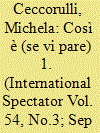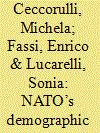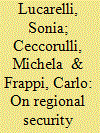|
|
|
Sort Order |
|
|
|
Items / Page
|
|
|
|
|
|
|
| Srl | Item |
| 1 |
ID:
168605


|
|
|
|
|
| Summary/Abstract |
The importance of the portrayal of reality in the press is well recognised, especially with respect to its capacity to affect public opinion. Articles on migration found in the Italian press with respect to four periods – the 2014 European Parliament elections; the end of the Mare Nostrum operation in the Mediterranean in 2014; the EU-Turkey Statement of March 2016; and an eventless week in 2016 – revealed five main narratives: solidarity, responsibility, state-centred (Westphalian), instrumental and humanitarian. Each of them had its own specificities, while all were informed by Italy’s condition as a frontline state with regard to migration – the EU’s gatekeeper – and its paradoxical state of living in a ‘permanent/potential emergency’, constantly torn by its inability to reconcile security and humanitarian needs. An understanding of justice as non-domination was the main result of the analysis carried out, while there was little reference to migrants’ human rights.
|
|
|
|
|
|
|
|
|
|
|
|
|
|
|
|
| 2 |
ID:
154839


|
|
|
|
|
| Summary/Abstract |
Migration did not figure in the European Security Strategy of 2003. Never mentioned as a threat, it was not even mentioned as a risk. Thirteen years later, migration is widely cited in the new European Union Global Strategy. Much richer than the previous security document and global in aspiration, the Global Strategy treats migration as a challenge and an opportunity, recognising the key role it plays in a rapidly changing security landscape. However, this multi-faceted perspective on migration uncovers starkly different political and normative claims, all of which are legitimate in principle. The different narratives on migration present in the new strategic document attest to the Union’s comprehensive approach to the issue but also to critical and possibly competing normative dilemmas.
|
|
|
|
|
|
|
|
|
|
|
|
|
|
|
|
| 3 |
ID:
156247


|
|
|
|
|
| Summary/Abstract |
Russia, cyberterrorism, Da’esh are among the most quoted challenges to NATO mentioned in the organizations’ documents, specialized literature and newspaper articles. How about a subtler, less striking but real challenge like demographic change? Demographic trends are increasingly recognized as relevant in understanding international politics and particularly international security, but only seldom taken into consideration when dealing with NATO’s future challenges. NATO, hence, suffers from the limits of a political–military institution designed for a post-Second World War demographic and security context that is changing drastically – and is expected to change even more in the foreseeable future. The aim of this article is to explore the current and projected demographic trends at the global level, evaluate their security implications and then draw inferences for the challenges and opportunities that will arise for NATO out of the sketched scenarios. Based on this analysis, we posit that the Alliance is facing a demographic paradox, whereby it is increasingly unable to cope with external demographic challenges because internal demographic changes are weakening the cohesion needed to provide an effective response.
|
|
|
|
|
|
|
|
|
|
|
|
|
|
|
|
| 4 |
ID:
151390


|
|
|
|
|
| Summary/Abstract |
Already introduced to the academic and political debate some years ago, the concept of “security governance” still needs to be clarified. In particular, four main shortcomings need to be overcome to make the concept more useful for an assessment of current security dynamics: in the first place, attention has been devoted more to “governance” than to “security”, while failing to consider the role of the understandings and perceptions of the actors involved in the governance system. Second, the literature on the actors (governmental or not) involved is still fragmented. Third, the literature on security governance has too often been detached from reflections on regionalism, while it would be useful to further explore the relationship between cognitive definitions of regional and security dynamics. Fourth, the literature has predominantly focused on Europe and the transatlantic area, overlooking processes of “region-building” in security terms in other “unexpected” geographical spaces. After proposing avenues to overcome the current gaps in the literature, the Southern Caucasus is chosen as a case study to show the different instances of security governance emerging, thanks to definitions of the region in security terms that have involved regional and external actors, of a state and non-state nature.
|
|
|
|
|
|
|
|
|
|
|
|
|
|
|
|
| 5 |
ID:
101013


|
|
|
|
|
| Publication |
2010.
|
| Summary/Abstract |
This article analyzes the role that fields of discourses have played in constructing migration as a security problem, with a specific focus on the development of the Eastern dimension. It does so by looking at three relations: sub-region/region; speech acts/securitization; and professionals/insecuritization. Speeches and documents testify to the security narrative and consequent security governance associated to the enlargement process and to relations with neighboring countries to the East. Moreover, an analysis of the rationale behind governmentality practices regarding migration accounts for the wide usage of technological and risk assessment tools, adding up to the security construction of migration. The overall security governance that has arisen through and out of these processes allows an evaluation of a securitized approach to migration and the impact this has on European Union objectives on that sub-region, such as stability and human rights protection.
|
|
|
|
|
|
|
|
|
|
|
|
|
|
|
|
|
|
|
|
|